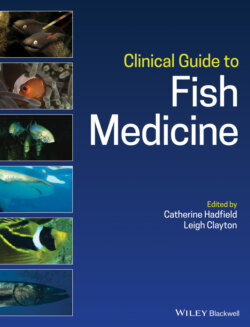Читать книгу Clinical Guide to Fish Medicine - Группа авторов - Страница 140
Metabolism and Energetics
ОглавлениеIntake needs can be estimated using predictive equations of the energy requirements of a species and the estimated or determined energy content of a food item. Energetic requirements are regulated by various factors including body weight (BW). Requirements are usually expressed in units of metabolic weight, allowing scaling for a variety of body sizes. For fish, metabolic weight is generally defined as body weight (kg)0.80 (NRC 2011). This scaling means that smaller fish should be fed at a higher percentage of body weight than larger fish. Other factors also affect energetic requirements, particularly activity level (e.g. feeding, breeding, or changes in water flow) and water temperature, with relatively linear increases in energy expenditure with increasing water temperature (NRC 2011).
There are several published equations to calculate maintenance energy requirements of fish, but they vary dramatically by species and water temperature (NRC 2011). For example, the estimated maintenance energy requirements of rainbow trout (Oncorhynchus mykiss) vary from 4.54 to 17.93 kcal/kg0.80 (NRC 2011). With few energetic requirement equations available, and differences based on species, body size, activity level, and water temperature, these estimates of intake needs should be used as a guide only. Animals should always be fed to appropriate body condition.
